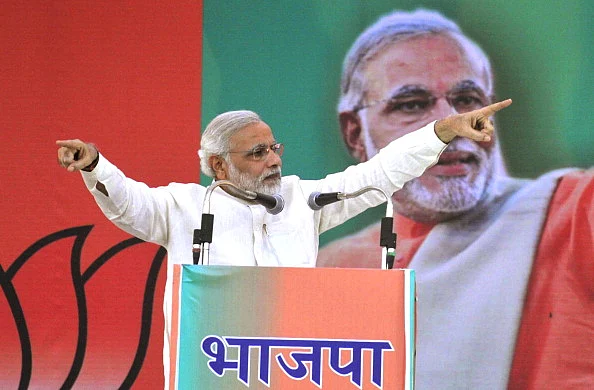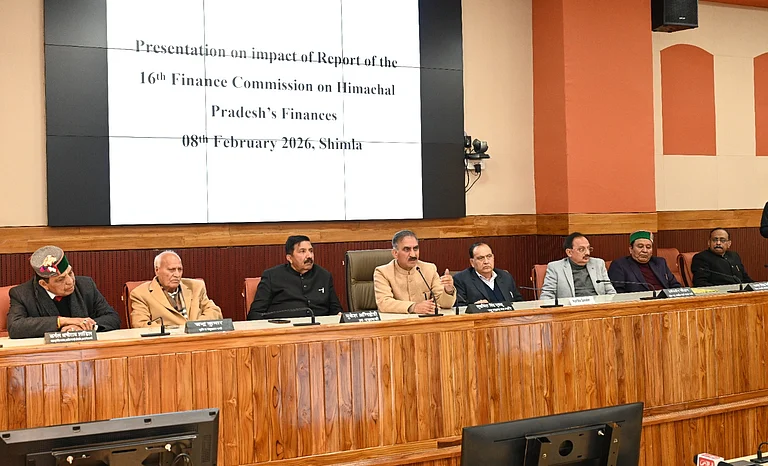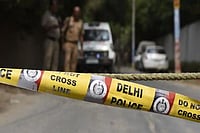In what can be seen as political life coming a full circle, the Opposition parties are now accusing Prime Minister Narendra Modi's Union Government of not sharing appropriate funds with the states — just like Modi accused the then-United Progressive Alliance (UPA) government led by Congress during his chief ministerial years.
As the Chief Minister of Gujarat during 2001-14, Modi accused the then-UPA government of extracting revenues from the state but not sharing enough in return. He also criticised the Congress-led government at the time on account of federalism by ignoring the economic disparities among the states. Now, a decade into power, he is facing similar allegations from Congress and other Opposition.
The three Opposition-ruled southern states of Karnataka, Tamil Nadu, and Kerala are up in arms against the Centre over fiscal federalism. Earlier this week, the entire Karnataka Congress-led government, including CM Siddaramaiah, staged a protest at Delhi's Jantar Mantar over the alleged non-payment of dues by the Modi government and the "gross injustice" from tax devolution. Earlier, West Bengal CM and Trinamool Congress (TMC) supremo Mamata Banerjee held a dharna over similar complaints in Kolkata.
Here we explain why the Opposition-ruled states are protesting and how it echoes Modi's complaints from his chief minister's days.
How PM Modi Attacked Centre Over Finances As CM Of Gujarat
As the Chief Minister of Gujarat, Narendra Modi accused the then-UPA government led by Congress of unjust treatment with his state. He criticised the UPA government of ignoring the state's economic disparities and treating Gujarat unjustly.
In an undated video in circulation, in context of the ongoing Opposition-led states' protests, Modi is seen saying in Gujarati that while Gujarat contributes Rs 60,000 crores to the central government's treasury, it gets just Rs 8-12,000 crores in return.
He further says: "Is Gujarat a beggar, my brothers and sisters? Is Gujarat standing before Delhi with a begging bowl? Can Gujarat not survive if does not get alms from Delhi?"
During the ongoing protests, Karnataka CM Siddaramaiah referred to Modi's stand as the CM of Gujarat and slammed him for criticising the southern states' demands now.
He said, "How is it that [current demands] threat to the country's integrity, which did not surface when he raised his voice as the then Chief Minister of Gujarat against the Centre over devolution of tax share, is surfacing now when we Kannadigas raise our voice?"
Siddaramaiah further said that Modi as CM of Gujarat had called for a share of 32-50 per cent for states from the central taxes. He further said that Modi had wondered publicly as to why Gujarat should not keep all of its tax collections. He said, "he had argued that the Finance Commission should change the parameters being followed for devolution of taxes. He had demanded that the commission should encourage states with prudent financial management. He had argued that the present method was ignoring states with prudent financial management by encouraging States that have failed in financial management. Was it not an anti-Centre stand?"
In 2008, Modi as the CM of Gujarat accused the then-UPA government of Congress of ignoring regional economic disparities.
"However, very little effort has been made by the government of India to address the issues of regional economic disparities. During the last 60 years of operations of various finance commissions, the inter-state and the intra-state economic disparities have only increased," said Modi, as per PTI.
In 2012, Modi in an interview said that the Congress-led UPA government at the time had been treating Gujarat "like an enemy state" since coming to power in 2004.
"We have complaint that in the last eight years the central government has treated Gujarat like an enemy state. They have treated Gujarat in a way what is also not expected for an enemy nation. The central agencies are being used against Gujarat. Gujarat is the growth engine of the country today. But the central government only for political reasons is not leaving any chance to ruin the state," said Modi, according to Rediff News.
In 2012, Modi wrote to the then-PM Manmohan Singh to complain that the UPA government had brought the tax deduction at source (TDS) on properties without consulting the states. "The Chief Minister has also pointed out that the Centre has not even cared to consult the States on such a vital issue which affects the common man and also the State’s finances in a big way. It is very clear that to ensure its own income, the Government of India has, once again, overlooked the nation’s federal arrangements, he said," a press release from the Gujarat government at the time said.
Why Are Opposition-Run States Protesting?
The Opposition states are alleging that the Centre is unfair in devolution of taxes and is not adhering to good federal fiscal practices.
The Opposition-ruled states, particularly the industrious states of Karnataka and Tamil Nadu, also allege that they contribute much more to the national economy than what they get from the Centre.
The Hindustan Times reports that the protests are primarily based on five points:
The share of states in central taxes
The Centre's support for states' borrowing
The issue of special assistance to states by Centre on issues of drought, flood, etc
The funding of major infrastructure projects in states
The end of the GST compensation
Of these points, the share of states is decided by the Financial Commission and the issues of special assistance and funding of major infrastructure projects are discretionary — putting BJP-run states at a natural advantage. The end of the GST compensation was always known — the Centre, as per the terms of the Goods and Services (GST) Tax's terms, had to compensate states for five years for any shortfall they might have had because of change of the taxation system.
In the sphere of the Centre's support for states' borrowing, the Opposition has alleged that the Centre has arbitrarily restricted their borrowing limit by misusing power under Article 293 of the Constitution, which governs borrowing by the states and gives the Centre powers to impose conditions on state's borrowings on account of fiscal prudence. In a letter to Kerala CM Pinarayi Vijayan to support his stance against the Centre on the issue, Tamil Nadu MK Stalin wrote that the "prior consent from the Union government has been converted into a restrictive tool to limit deficit financing beyond the limits prescribed by the State Fiscal Responsibility and Budget Management Act," according to HT.
In the case of Karnataka, CM Siddaramaiah said the state is second in the country in term of tax collection, but does not proportionate share from the Centre. The state government has also been miffed over the lack of any substantial central grants to tackle drought conditions in the state.
"This year, Karnataka is contributing more than Rs 4.30 lakh crore as tax. If we collect Rs 100 and give it to the Government of India, we are only getting Rs 12-13 back," said Siddaramaiah.
Slamming the "unscientific" GST, Siddaramaiah further said, "the state’s projected growth from 2017 to the conclusion of financial year 2023-24 amounts to Rs 4.92 lakh crore. However, the anticipated actual collection for the state stands at Rs 3.26 lakh crore. Of the shortfall of Rs 1.65 lakh crore, the Union government has compensated the state with Rs 1.06 lakh crore, resulting in a loss of Rs 59,274 crore."
In the case of Kerala, Finance Minister KN Balagopal said the Centre 'curtailed' Rs 57,400 crore in the state's receipts in the current fiscal year.
As for Tamil Nadu, a state official told HT that between 2014-15 and 2022-23, the Centre gave the state Rs 4.75 lakh crore, including the central tax share of Rs 2.46 lakh crore and subsidy of Rs 2.28 lakh crore, whereas direct tax collection from the state in this period was Rs 6.23 lakh crore. The official further flagged that the state's share from central taxes had decreased from 5.305 per cent under the 12th Finance Commission to 4.079 per cent under the 15th Finance Commission.


























